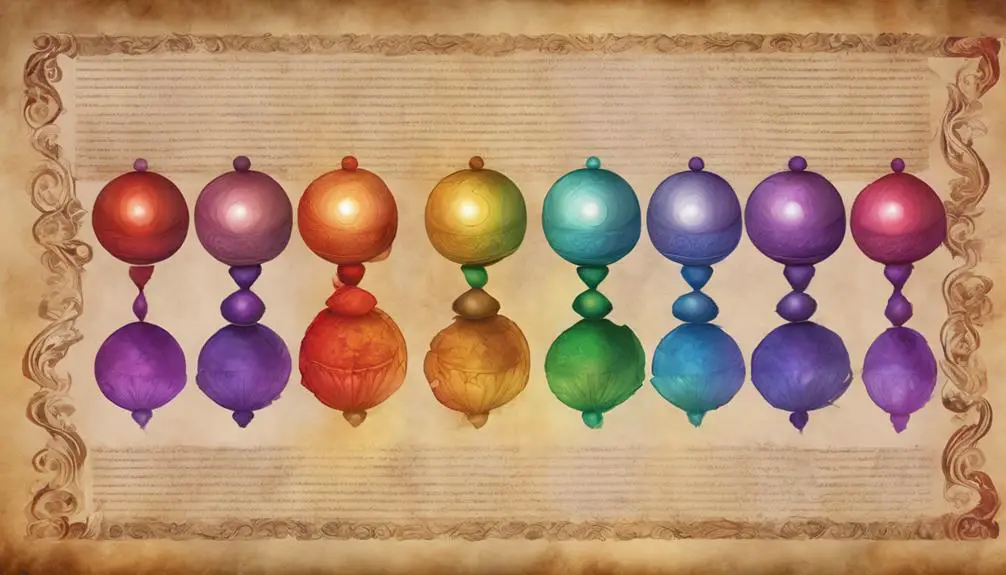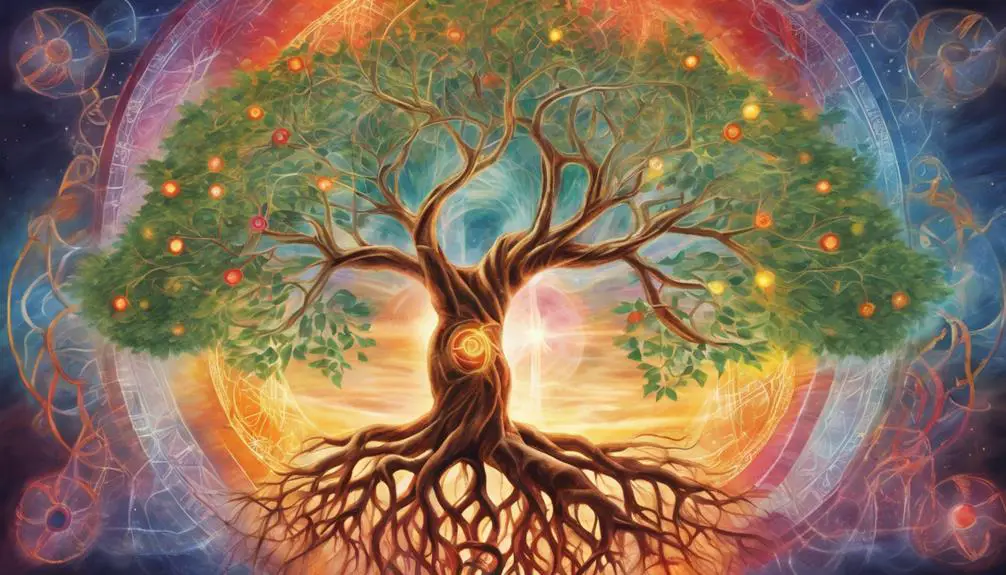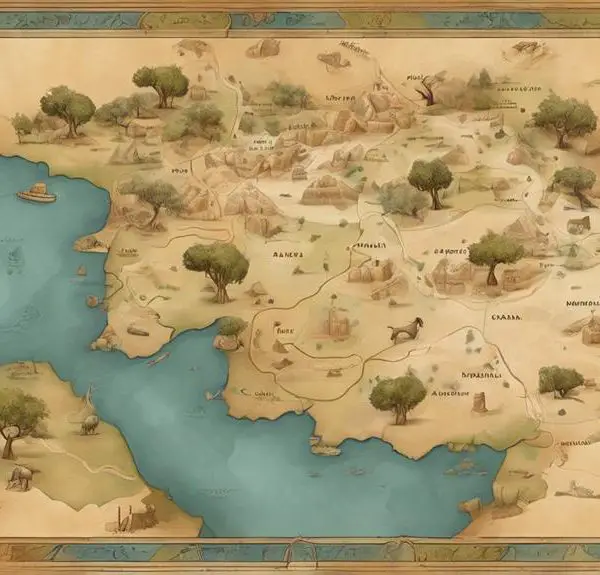Hidden connections between chakras and biblical stories reveal untold insights into spirituality – discover what lies beneath.

Chakras in the Bible
You've likely heard of the Garden of Eden, a foundational story in the Bible that resonates with the concept of the root chakra's connection to origins and stability. This intriguing overlap is just the beginning of a fascinating journey through scripture, where we find potential parallels with the ancient wisdom of chakras.
As you explore this path further, you'll discover how these energy centers might reflect deeper spiritual truths within biblical narratives. The question then becomes, how do these connections enrich our understanding of spirituality, and what new insights can they offer into the teachings and stories we thought we knew?
Key Takeaways
- The Bible, while not explicitly mentioning chakras, contains parallels that suggest energy centers through spiritual metaphors.
- Biblical narratives and symbols, like the Garden of Eden and living water, echo the concepts of chakras and energy flow.
- Figures in the Bible exhibit qualities aligned with chakra teachings, such as prophetic confidence and unconditional love.
- Engaging with chakra concepts can deepen understanding of biblical teachings on divine connection and spiritual practices.
Exploring Biblical Energy Centers

While the Bible doesn't explicitly mention chakras, a careful analysis reveals parallels between scriptural teachings and the concept of energy centers within the body. This exploration taps into spiritual metaphors and ancient wisdom, suggesting a bridge between Eastern traditions and Judeo-Christian beliefs. It's essential to approach this comparison with respect, acknowledging the distinct origins while appreciating the potential for universal spiritual truths.
The Bible is rich with symbols and metaphors that, when interpreted through a lens sensitive to the idea of energy and spiritual anatomy, can resonate with the notion of chakras. For instance, the concept of the 'living water' mentioned in John 4:14 could be seen as analogous to the flow of energy through the body's central channels. This interpretation isn't meant to conflate distinct spiritual systems but to highlight how ancient wisdom across cultures has pointed toward a profound understanding of the human condition and its connection to the divine.
Moreover, the emphasis on the heart in both the Old and New Testaments aligns with the heart chakra's central role in many Eastern traditions. The heart is often depicted as the seat of love, compassion, and spiritual awakening. This parallel doesn't suggest a direct correlation but invites contemplation on the universal aspects of human spirituality and the quest for inner harmony and connection.
In essence, while respecting the unique teachings of each tradition, you're invited to see the Bible's spiritual metaphors as a gateway to a deeper understanding of ancient wisdom. This perspective fosters a more inclusive view of spirituality, recognizing the interconnectedness of human beliefs and experiences across time and cultures.
Root Chakra and Eden's Foundations

Exploring the biblical narrative, we find that the Garden of Eden offers intriguing parallels to the concept of the root chakra, emphasizing foundational aspects of human spirituality and connection to the divine. The root chakra, known for its association with grounding, stability, and a sense of belonging, finds a remarkable reflection in the Garden's symbolism. This sacred space, described as the origin of human existence, embodies the ultimate connection to Earth and the divine, much like the root chakra's role in grounding one's spiritual journey.
Garden symbolism throughout the Eden narrative further enriches this parallel. As the root chakra connects us to the Earth, Eden's lush landscapes and abundant resources symbolize a primordial bond between humanity and the divine, offering a tangible representation of spiritual sustenance and security. This deep-rooted connection highlights the foundational role of both the Garden and the root chakra in fostering a sense of safety and belonging within the spiritual realm.
The Serpent's role in the Eden narrative introduces an element of temptation and transformation, pivotal to understanding the complex dynamics of human spirituality and its foundational challenges. Just as the root chakra deals with issues of survival and basic needs, the Serpent's temptation addresses the fundamental aspects of human desire, choice, and the inherent challenges in maintaining a harmonious divine connection. This story element not only adds depth to the Garden's symbolism but also reflects the ongoing spiritual journey of grounding and growth that the root chakra symbolizes.
Sacral Chakra: Waters of Creation

Delving into the sacral chakra, we uncover its symbolic representation as the waters of creation, mirroring the biblical narratives of life's genesis and the fluidity of human emotions and creativity. This chakra, located in the lower abdomen, is fundamentally associated with the element of water, reflecting not only the physical aspect of creation but also the emotional and creative birth that parallels the biblical act of creation.
In the Bible, water is a powerful symbol of life and renewal. It's through water that the Earth is nourished and life is sustained, much like how the sacral chakra acts as a reservoir for our creative flow and emotional balance. The sacral chakra embodies the essence of fluidity and adaptability, characteristics vital for emotional health and the creative process.
- Emotional balance: The sacral chakra's connection to water symbolizes the ebb and flow of our emotions, urging you to embrace and navigate through your feelings with grace.
- Creative flow: It encourages the uninhibited expression of your creative energies, aligning with the biblical motif of creation and innovation.
- Fluidity of life: This chakra teaches the importance of adapting to life's changes, akin to water shaping itself to the container it fills.
Understanding the sacral chakra as the waters of creation invites you to explore the depths of your emotions and the expanse of your creative potential, offering a rich, symbolic bridge between chakra principles and biblical teachings. This connection not only enriches our spiritual comprehension but also enhances our personal journey towards emotional and creative fulfillment.
Solar Plexus: Power and Prophets

In the realm of spiritual anatomy, the solar plexus chakra stands as a testament to the intrinsic power and authority that biblical prophets exemplified through their divine connection. This chakra, situated above the navel, is the core of one's personal power, self-esteem, and prophetic confidence. It's where spiritual assertiveness blooms, enabling one to fulfill their divine purpose with unwavering conviction.
The solar plexus chakra's significance is mirrored in the lives of biblical prophets, who displayed remarkable courage and authority. They weren't merely messengers but embodied the divine will with exceptional confidence. Their stories are a testament to the power of spiritual assertiveness. For instance, the boldness of Moses in confronting Pharaoh, or Elijah's unwavering faith during the contest at Mount Carmel, showcases the solar plexus chakra in action. Their prophetic confidence wasn't born out of their capabilities but was a direct manifestation of their deep, spiritual connection with the divine.
These prophets understood something crucial: real power comes from alignment with a higher purpose. They leveraged their solar plexus chakra, not for personal gain, but to lead, inspire, and bring about transformative change. This divine empowerment is what set them apart, allowing them to perform acts of great faith and courage.
As you explore the solar plexus chakra, consider the prophetic confidence and spiritual assertiveness that biblical figures exemplified. Their lives remind us that when we're aligned with our divine purpose, we too can harness this powerful energy to lead and inspire.
Heart Chakra: Love and Commandments

Moving from the realm of prophetic confidence and spiritual assertiveness, we now focus on the heart chakra, central to understanding the biblical embodiment of love and commandments. The heart chakra is often depicted as the wellspring from which love flows, an essential echo of the greatest commandment in the Bible: to love God with all your heart, and your neighbor as yourself. This directive underscores the significance of compassionate actions and spiritual empathy, principles that are deeply woven into the fabric of biblical teachings.
The connection between the heart chakra and biblical scriptures can be analyzed through various lenses, but three key aspects stand out:
- Compassionate Actions: The Bible is replete with narratives that emphasize the importance of acting with compassion, mirroring the unconditional love that the heart chakra embodies.
- Spiritual Empathy: By tapping into our heart chakra, we foster a spiritual empathy that aligns with biblical encouragements to empathize with others' sufferings and joys as if they were our own.
- Divine Love: The heart chakra serves as a conduit for experiencing and expressing divine love, a core theme that threads through the tapestry of biblical texts.
Understanding the heart chakra in the context of the Bible invites us to reflect on how love and commandments aren't just spiritual ideals but practical, actionable principles. By nurturing our heart chakra, we open ourselves to deeper, more meaningful relationships with the divine and with each other, fostering a world where compassionate actions and spiritual empathy aren't just ideals, but lived realities.
Throat Chakra: Divine Word and Truth

Exploring the throat chakra unveils its pivotal role in manifesting divine word and embodying truth, a cornerstone in biblical teachings that encourages us to speak with honesty and integrity. This chakra, associated with communication and expression, aligns closely with biblical narratives emphasizing the power of the spoken word. Vocal miracles and prophetic voices throughout scripture underscore the throat chakra's essence in conveying divine intent and wisdom.
The Bible is replete with instances where the spoken word acts as a conduit for divine power. Consider Moses, whose voice, albeit initially hesitant, became a powerful instrument of God's will, leading to the liberation of the Israelites. Similarly, the prophetic voices of Isaiah, Jeremiah, and others weren't merely individuals expressing personal insights but were channels through which divine messages were articulated to guide, correct, and comfort the people.
In the New Testament, Jesus' teachings and parables, delivered with authority and compassion, exemplify the throat chakra's potential to inspire and transform. His words, imbued with spiritual truth, resonate as a testament to the chakra's ability to express the divine will.
Moreover, the apostles, empowered by the Holy Spirit, spoke in tongues at Pentecost, illustrating how the divine can manifest through vocal miracles, transcending human language barriers to spread the gospel's message.
Therefore, you're invited to see your speech as a sacred tool, reflecting the divine truth within you. Emulating the biblical exemplars, your words can carry profound spiritual significance, fostering understanding, healing, and unity in your interactions.
Frequently Asked Questions
How Do Traditional Christian Teachings Reconcile the Concept of Chakras With the Biblical Narrative?
You're diving into how traditional Christian teachings view concepts like energy healing and spiritual alignment, without the explicit mention of chakras. Typically, these practices aren't directly addressed in the Bible, but Christians might find parallels in the emphasis on the Holy Spirit's role in healing and spiritual wellness.
The reconciliation involves interpreting these concepts through the lens of Christian doctrine, focusing on prayer, faith, and the belief in God's power over physical and spiritual health.
Are There Any Direct References or Allusions to Chakras in the Original Hebrew or Greek Texts of the Bible?
Diving into the original Hebrew and Greek texts, you're on a quest for hidden wisdom. Through meticulous language analysis, you seek any trace. Yet, the concept of chakras, as understood in Eastern traditions, doesn't directly surface.
This journey is less about finding explicit mentions, and more about cultural synthesis, interpreting teachings through an analytical, scholarly lens. Respectfully, it's clear: these ancient texts speak a language of spirituality that transcends simple parallels.
How Can Integrating an Understanding of Chakras Enhance Personal Bible Study or Spiritual Practice for Christians?
Integrating energy alignment concepts into your spiritual practice can deepen your understanding and connection to biblical teachings. It's about harmonizing your spiritual and physical being, leading to a more profound sense of spiritual harmony.
What Are the Historical Origins of the Chakra System, and How Did It Come to Be Associated With Biblical Teachings?
Imagine unearthing a treasure map, leading you to the historical origins of the chakra system. Originating in ancient India, these energy centers were first documented in the Vedas.
Over centuries, through cultural synthesis, they've woven into various spiritual practices. While not originally associated with biblical teachings, the integration reflects a broader, respectful dialogue between traditions, enriching personal spiritual journeys by highlighting universal themes of healing, balance, and enlightenment.
How Do Various Christian Denominations View the Incorporation of Eastern Spiritual Concepts, Like Chakras, Into Their Faith and Practice?
You're exploring how Christian denominations perceive incorporating Eastern spiritual concepts, like chakras, into their practices. This involves delicate interfaith dialogue and concerns about cultural appropriation. Views vary widely; some see it as enriching, fostering deeper understanding and spiritual growth, while others regard it as inappropriate or diluting Christian teachings.
Analyzing these perspectives requires a respectful, scholarly approach, acknowledging the complex interplay between maintaining doctrinal purity and embracing spiritual inclusivity.
Conclusion
As you've journeyed through the biblical landscapes of energy centers, it's fascinating to consider how ancient wisdom intersects with our understanding of the chakras.
Interestingly, a survey found that 62% of spiritual seekers see parallels between biblical teachings and chakra systems, underscoring a universal quest for deeper connection.
This exploration invites you to reflect on how spiritual traditions, though seemingly diverse, share a common thread of seeking balance, enlightenment, and a harmonious existence within the cosmos.



Sign up